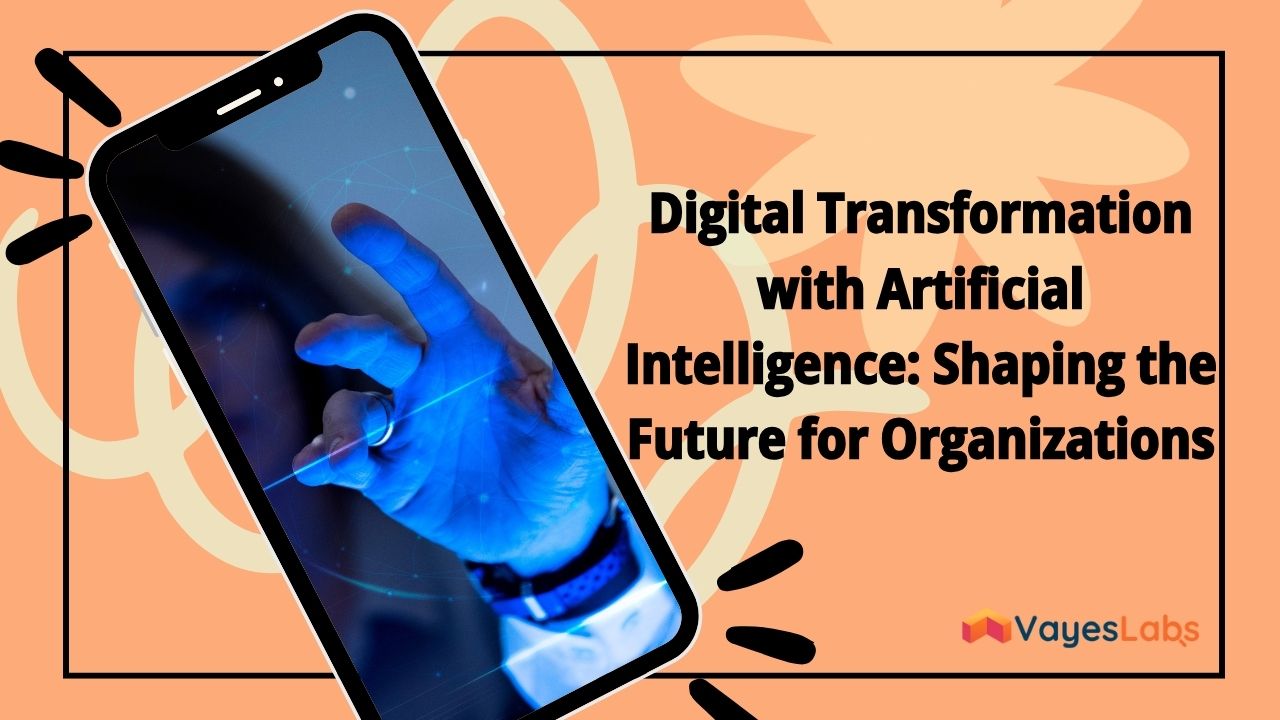Table of Contents
- The Role of Artificial Intelligence in Digital Transformation
- Advantages of Artificial Intelligence for Organizations
- Data-Driven Decision-Making Processes
- Personalizing Customer Experience with Artificial Intelligence
- AI-Supported Automation and Efficiency Gains
- Security and Ethical Dimensions of AI Applications
- Future Business Models with Artificial Intelligence
- Strategies for Using AI in Digital Transformation
- Vayes Labs’ Support for Strategic Transformation with AI
The Role of Artificial Intelligence in Digital Transformation
Artificial intelligence has become one of the most critical tools in accelerating businesses' adaptation to technology during the digital transformation process. By revolutionizing traditional business models, this technology contributes to companies becoming more agile and innovative through advancements in data analysis, automation, and machine learning. Businesses can analyze customer behavior, predict market trends, and continuously optimize their processes using AI-powered algorithms. The deep learning techniques offered by AI enable companies to extract meaningful insights from vast data pools, facilitating strategic decision-making.
AI-supported systems significantly enhance corporate efficiency. For instance, in the manufacturing sector, smart sensors and robots make processes more efficient, while in the financial sector, risk analysis is performed faster and more reliably with AI-powered algorithms. In healthcare, analyzing patient data to provide more accurate diagnoses has become possible thanks to AI. In short, AI transcends being just a technology in the business world, emerging as a transformative tool that reshapes companies’ future-oriented visions.

Advantages of Artificial Intelligence for Organizations
AI technologies offer numerous advantages to organizations, making business processes more efficient, faster, and error-free. Companies can save time and costs by minimizing manual processes with these technologies. Particularly in data analytics, AI provides significant convenience by analyzing large datasets, enabling businesses to make strategic decisions. For example, marketing teams can predict customer trends and create customized campaigns for target audiences. In the financial sector, AI-based systems help minimize risks in critical security processes like fraud detection.
AI also offers a significant advantage in terms of workforce efficiency. Human resources departments can accelerate candidate evaluation processes using AI-supported systems to identify the most suitable employees. In customer service, chatbots and virtual assistants provide 24/7 support, helping businesses increase customer satisfaction. Another key benefit for companies is AI’s ability to minimize errors in business processes. In industries where human errors can lead to significant costs, AI-supported automation systems ensure more reliable operations.
Data-Driven Decision-Making Processes
In today’s business world, data-driven decision-making has become a critical factor for companies to gain a competitive edge. AI analyzes large datasets to provide valuable insights into market trends, customer behaviors, and operational efficiency. For example, e-commerce companies can determine which products attract more interest using AI-supported analytics and optimize their inventory management accordingly. In the financial sector, AI-based algorithms enable more accurate risk calculations in credit assessment processes.
Moreover, AI-supported decision-making systems provide predictability and speed to businesses. Traditional data analysis methods, often reliant on manual processes, can be time-consuming and prone to human error. However, AI can analyze millions of data points in seconds, enabling companies to make more informed and strategic decisions. Predictive modeling offered by AI helps companies proactively prepare for potential market changes, minimizing risks.
Personalizing Customer Experience with Artificial Intelligence
AI revolutionizes customer experience by offering personalized services. Today, consumers show greater interest in brands that provide tailored recommendations and solutions. AI can analyze user behavior to offer personalized product and service suggestions. For instance, platforms like Netflix and Spotify use AI algorithms to recommend the most suitable content based on users’ past preferences. E-commerce sites analyze customers’ shopping habits to provide personalized campaigns and discounts.
AI also transforms customer service. Chatbots and virtual assistants offer fast and effective solutions 24/7, reducing wait times. AI-supported call center systems analyze customer requests and direct them to the most suitable agents. This increases customer satisfaction while reducing operational costs for businesses. By further personalizing customer experiences, AI strengthens brand loyalty.
AI-Supported Automation and Efficiency Gains
AI-supported automation is a key factor in boosting businesses’ operational efficiency. Automation systems take over repetitive and time-consuming tasks, allowing employees to focus on higher-value work. For example, robots used in production lines operate at high speed and precision without human intervention, saving both time and costs. In financial services, AI enhances speed and accuracy in critical areas like fraud detection and risk management, creating more efficient processes.
AI-supported automation also minimizes errors. While human errors can lead to time loss and financial damage, AI systems deliver more reliable results. In the logistics sector, vehicle tracking systems, route optimization, and storage solutions become more effective with AI. Such innovative automation applications help businesses increase both operational efficiency and profitability.
Security and Ethical Dimensions of AI Applications
While AI offers advanced data processing and analysis capabilities, security and ethical concerns also come to the forefront. Companies face obligations to protect user privacy while collecting data from large pools. Data security becomes more complex with AI applications, and unauthorized use of this data can lead to serious ethical issues. Therefore, ethical principles are of great importance in the design and use of AI systems.
Transparency must be ensured in AI-driven decision-making processes. How algorithms work and what data they rely on should be understandable to users, ensuring trust and accountability. AI systems’ security must be continuously updated and protected against external threats. These measures safeguard both companies and users, enabling the broader adoption of AI applications.
Future Business Models with Artificial Intelligence
AI lays the foundation for the business models of the future. This technology reshapes companies’ operational processes, increasing efficiency and reducing costs. In the future, AI-integrated business models will be faster and more flexible. For instance, AI-supported smart factories in the manufacturing sector will have the capacity to quickly adapt to demand changes. In customer relationship management (CRM), AI-based systems will create new opportunities for companies to offer personalized services.
New business models will also become more dynamic by integrating AI into decision-making processes. This enables companies to respond quickly to market trends and meet customer demands faster. AI-enhanced products and services will appeal to a broader customer base, boosting companies’ growth potential.
Strategies for Using AI in Digital Transformation
Developing strategies for using AI in digital transformation is critical for companies’ long-term success. First, companies should analyze their current processes to identify areas where AI applications can be integrated, enabling more efficient and faster operations. Improving data collection and analysis methods ensures more accurate decisions based on reliable data.
To adopt AI applications, companies must train their employees and accelerate their adaptation to new technologies. Providing the necessary training for employees to use AI effectively plays a significant role in this transformation. Lastly, transparency, security, and ethical values should be prioritized in digital transformation strategies for successful implementation.
Vayes Labs’ Support for Strategic Transformation with AI
Vayes Labs empowers organizations’ strategic transformation processes using AI technologies. Our customized solutions enhance businesses’ data-driven decision-making capabilities, making it possible to predict market trends and gain a competitive edge. With deep learning and data analytics, Vayes Labs helps companies achieve an agile structure in the digital world. Our team supports you at every stage, from strategic planning to implementation, integrating AI into your business processes to ensure you’re ready for the future.




